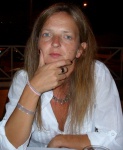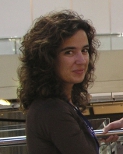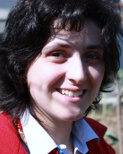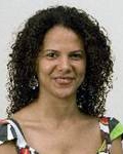People

Helena Machado hmachado@ics.uminho.pt
Additional information:Principal Investigator Helena Machado who has a Ph.D. in Sociology, is Associate Professor, with Agrégation, at the Department of Sociology at the University of Minho. She is a member of the Research Centre for the Social Sciences and the Centre for Social Studies at the University of Coimbra. Her research interests focus on the sociology of forensic genetics, genetisation of social relations and the media representations about uses of technology in crime control. She has coordinated several research projects in these areas, with the support of the Foundation for Science and Technology. Helena Machado has been developing pioneer research into the political and social impacts of the creation of a forensic DNA database in Portugal. 
Susana Costa susanacosta@ces.uc.pt
Additional information:Susana Costa is a researcher at the Centre for Social Studies of the University of Coimbra and a member of the Research Group on Studies on Science, Economy and Society (NECES). She holds a Ph.D. in Sociology awarded by the University of Coimbra for her thesis on DNA testing in paternity suits. Her research interests have focused on the relationship between science and law, including an ethnographic study in a forensic laboratory. She is currently developing a study on the evolution of the uses of DNA technology in criminal investigation, involving a comparative approach to Portugal and the United Kingdom. 
Cíntia Alves calves@ipatimup.pt
Additional information:Cíntia Alves has a Masters degree in Applied Human Genetics. She works in the field of forensic genetics and, since 2003, is responsible for the Parentage Investigation and Genetic Identification Laboratory at IPATIMUP in Porto, Portugal. She is a member of the International Society for Forensic Genetics (ISFG) and of the Spanish and Portuguese Speaking Working Group of the ISFG (GHEP-ISFG). She is involved and collaborates in several scientific research projects mostly in the areas of population and forensic genetics. 
Ana Maria Brandão anabrandao@ics.uminho.pt
Informação adicional:Ana Maria Brandão, sociologist, is an Adjunct Professor at the Department of Sociology of the University of Minho (Portugal). She concluded her PhD in Sociology in 2008 with a thesis called “What if you were a boy?” Female homo-eroticism and the social construction of identity. Her research interests focus specifically on identities, especially considering the intersection between sexuality and gender. |

Susana Silva
susilva@med.up.pt
Additional information:Susana Silva(Ph.D. in Sociology) is a senior researcher at the Department of Clinical Epidemiology, Predictive Medicine and Public Health and Cardiovascular Research & Development Unit, University of Porto Medical School, Portugal. She is also a senior researcher in the Institute of Public Health (ISPUP) at the University of Porto. Her main research interests centres on the links between medicine, technology, law and gender, focusing on social uses of reproductive and genetic technologies and on public understanding of biotechnology and health. She is involved in several scientific research projects, with the support of the Foundation for Science and Technology, including coordinating studies on the decisions of infertile couples regarding the fate of cryopreserved embryos and on parental roles and knowledge in neonatal intensive care units. 
António Amorim
aamorim@ipatimup.pt
Additional information:António Amorim has a Degree in Biology and a PhD in Anthropology and is Full Professor since 1993 at Faculty of Sciences, University of Porto. His research, at IPATIMUP, is focused on formal and population genetics, pure and applied (mainly to humans), namely paternity and kinship expertise (Parentage Investigation and Genetic Identification Laboratory) and diagnosis of genetic diseases. He is a member of the International Society for Forensic Genetics (ISFG) and currently Vice-President of the Spanish and Portuguese Speaking Working Group of the ISFG (GHEP-ISFG) and was formerly President of the Portuguese Society of Human Genetics (SPGH). He is Coordinator of GABBA (Graduate Program in Areas of Basic and Applied Biology), PhD Program in Biology (PDB) and MSc Program in Forensic Genetics (MGF). Member of the Editorial Board of: Frontiers in Genetics, Open Forensic Sciences Journal, TheScientificWorldJOURNAL. 
Alice Delerue Matos
adelerue@ics.uminho.pt
Additional information:Alice Delerue Matos is coordinator of the Research Group Population, Family and Health and full member of the Research Centre for the Social Sciences, University of Minho (Portugal). She holds a PhD in Social Sciences – Demography by the Catholic University of Louvain (Belgium) and a graduation in Sociology from ISCTE (Portugal). Her research interests include the Sociology of the Family and Sociology of Ageing with emphasis on the study of intergenerational family relationships and quality of life of older people. She participates in several research projects with the support of the European Commission, Foundation for Science and Technology (Portugal), and Francisco Manuel dos Santos Foundation. She is the national co-coordinator of the Survey of Health, Ageing and Retirement in Europe (SHARE). 
Alessandra Faria
alessandrafaria@ces.uc.pt
Alessandra Faria is a junior researcher at the Center for Social Studies, University of Coimbra, Portugal. She has a Master degree in Sociology awarded by the Department of Sociology at the Institute of Social Sciences of the University of Minho, with a thesis about representations of gender among female head single parents and poverty. She also holds a graduation degree degree in Sexual Education by Salesian University of São Paulo (Brazil). Her research interests focus on the relationship between gender, parenthood and sexuality with an emphasis on the intersections of gender with race/ ethnicity and social class. |
